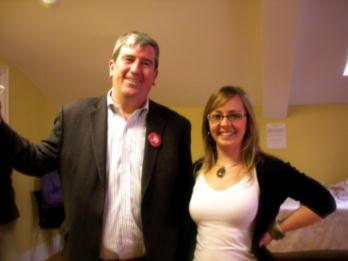Canada’s Charter of Rights and Freedoms turns 30 this week, so activists with the Queer Liberals came together at the Canadian Lesbian and Gay Archives April 14 to celebrate. But Stephen Harper’s Conservatives aren’t sharing the same sense of good cheer.
For Ontario Minister of Training, Colleges and Universities Glen Murray, it’s a time to celebrate but also to challenge the mindset of the current federal government. “It’s a really vivid point in our history in terms of minority rights,” he says. “I just wish our government would pay as much attention to this as they do to the War of 1812.”
The federal Conservatives have come under increasing heat over their perceived silence about the Charter’s anniversary on April 17. Federal Liberal MP Justin Trudeau appeared on CTV to argue that the party is ignoring the document for partisan reasons. His father, Pierre Trudeau, signed the Charter into law in 1982.
“It shows that we have a government that can’t get beyond its partisan ideology and its grounding,” Trudeau told CTV.
“The Conservatives are supposed to be about protecting individuals from an intrusive state, so you would think they’d like the Charter.”
Meanwhile, reports say the government is devoting millions of dollars to remember the historical 1812 conflict between Canada and the US and is spending $7.5 million on the Queen’s Diamond Jubilee.
For Murray, the importance of the Charter is personal. He recalls his groundbreaking run for the mayor’s office in Winnipeg in 1998 – when he became the first openly gay mayor of a North American city – and credits the Charter’s creation several years earlier. “It was in the wake of the Charter that most gay and lesbian and transgender people started running for elected office,” he says.
Penny Beams is the founder and co-president of the Queer Liberals, a partisan group that pushes for a queer-positive mandate within the party. The event reminds Beams of the importance of staying active in the political sphere.
“It’s really important, especially considering the number of advances we’ve made in the past 30, 40 years,” she says. “Just because we’ve made them and we feel a certain sense of comfort . . . doesn’t mean those rights are forever.”


 Why you can trust Xtra
Why you can trust Xtra


